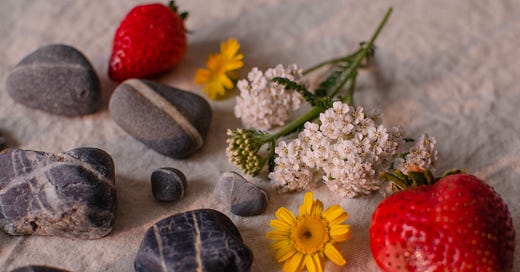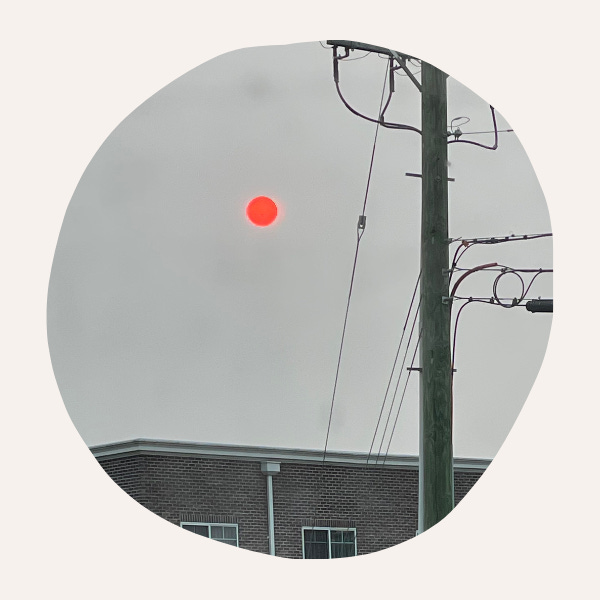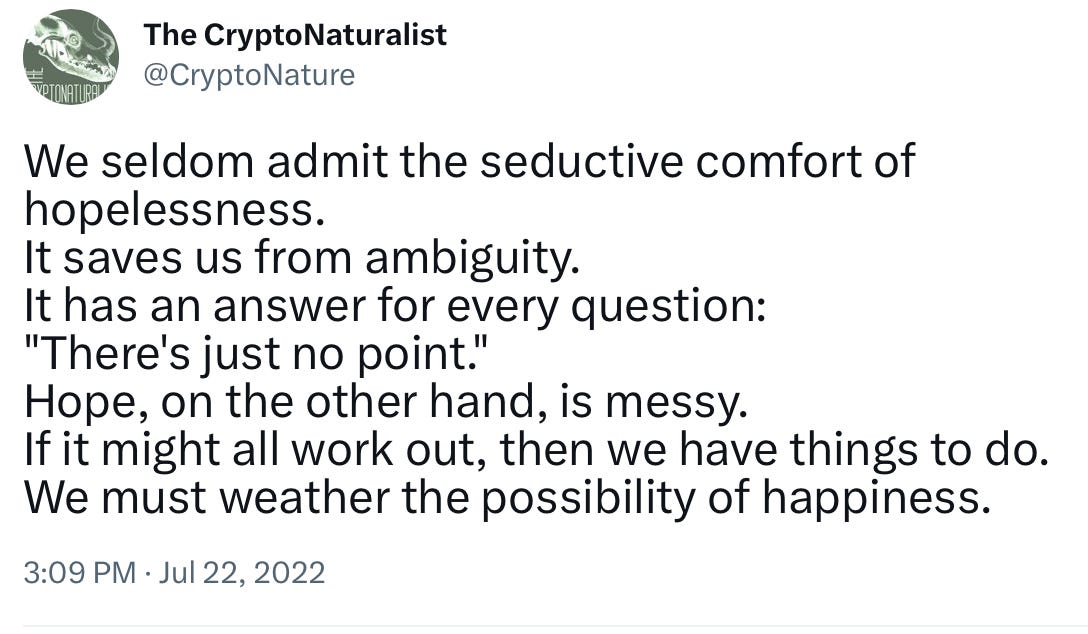I had a whole theme planned put for this month’s letters. Then I woke up yesterday and the sun looked like this:
I didn’t know it at the time but it was because of the current wildfires in Canada. I live seven hundred miles to the south of where these fires are blazing and the morning sun looked like Blade Runner 2049. I was so confused about why I couldn’t see the strawberry full moon on Sunday despite clear skies. This is why.
Canada is on track to have its worst ever wildfire season likely because of the unusually dry, unusually warm conditions. So far 8.2 million acres have been burned. That’s a bit more land than what makes up the state of Maryland.
Seeing a carnelian colored sun at 6:30am is alarming. Thinking about the destruction—of land, plants, animals, homes and lives—is devastating. Every time I come face to face with a disaster like this and I find myself thinking: What have we done? And then, there is the temptation—if for now it doesn’t directly affect me—to look away.
But that was the strange thing about the sun yesterday morning. You could look at it. Indeed, I accidentally did when I opened the curtains because it was so eerie and unusual my first bleary-headed thought was that is was somehow the moon still up. But no. It was the sun. And the murky, smoke filled air let you nearly look straight at it.
But then I turned away from the bright red sun and there was the first of our echinacea blooms, open, shining amongst all the green.
Blazing fires, smoke filled air, warmth that shouldn’t be so warm, no rain for too long, yet also the more-than-human world knows what season it is—knows what it must do—and it plugs away.
So I’m changing the theme, the intention, for this month.
This month’s theme is both the smoke filled air and the pristine, fresh echinacea flower. It’s being present in the season for all it is. It’s about how we can’t go back so how can we still have messy, stumbling hope?
I’m going to be laying a foundation for the upcoming work I’m going to be doing on Peace of the Whole. I’ll be exploring what it means and what it really looks like to live cyclically in the twenty-first century and why we should even try to.
It seems to me that in multiple, disparate corners of the internet right now, there is a lot of despondency, exasperation and talk of going backwards. At the very least, there is a lot of looking backwards—to how we used to eat, live, educate our children, disseminate information, birth babies, heal the body, etc. Generalizations are made, sometimes understandably and sometimes not. Sometimes, this is taken as far as conspiracy or racism. But even if it’s not, it’s looking to me like the modern world and modern culture is being cast as the villain.
In the space of a week, I was in a Zoom seminar with an “ancestral living,” midwife and educator and I also listened to a video from a libertarian, Christian, homeschool mom who both argued the same thing: modern = bad.1 Two very different people and yet their sentiments were nearly the same. Although they were both speaking to the public via the internet (if they noticed the irony they didn’t mention it), they spoke as if there is little if anything redeemable about the modern age. The midwife railed against the “overculture” that is oriented towards only death and destruction. The homeschool mom advocated for a tightly curated classical education based on the work of a childless educator at the turn of the twentieth century and seemed to see zero merit in most modern inventions. Machines only de-humanize us.
Both women, it seemed to me, rolled their eyes (on a camera/machine, yes) at the concept of “modern.” What a waste. What a cesspool. What a destructive force, the Modern. The subtext seemed to be: if you are a person who embraces something Modern you are contributing to the destruction too.
And I get it. I’ve thought this. One of my favorite films is Captain Fantastic.2 I understand.
In the past, in my most despondent moments thinking about the climate crisis and much of what else is happening in this technological age, I would find myself thinking what would happen if a solar flare or something wiped out all the “problematic” things—the machines, mostly. All the phones, all the computers, all the things drilling oil if possible (whatever they are). This, I figured,3 would plunge us back in time and cut us off from many of the conveniences that had created so many issues for us. People would be forced to go back to the skills that used to be common knowledge and kept us in touch with the land. I wasn’t advocating for this situation, because I realized it would not even be close to rosy. It would be an apocalypse in the true sense of the word. But at the time, in desperation, it was the only “way out” I could fathom.
It seemed there was no way out but being forced to go backwards. How else could we right this mess?
Now, it’s good to learn from the past. But there seems to be an impulse lately—and I’ve felt it—to demonize anything that doesn’t look like the way it used to be or done they way it used to be done. From the midwife I listened to this week: all modern practices, interventions, or doctors can only be destructive. From the homeschool mom: if you use a smartphone, particularly in front of your kids, you’re keeping company with those modern machines and that makes you less human.
As I listened to them both, I found these thoughts rubbing me the wrong way. There hasn’t been a golden age we can harken back to. Fetishizing the past is not the same as learning from it.
I don’t like the looks of many things right now either. But there is still abundance here. It’s hard to keep ahold of that because the lie of scarcity makes sales (for the midwife selling courses and the homeschooling podcaster too) but it’s true. I find that if I separate myself from the present moment by declaring it bad, then I fall into despondency or constant critique. I’m stuck. It’s not fair. There’s nothing but modernity.
With cyclical living it could be so easy to fall into fawning over the past. I know I have thought about cyclical living as returning to the lovely old ways of being and doing. Picking flowers, canning, wearing aprons. But the cycles that can guide us aren’t in the past. They exist in the present. They exist alongside the machines and modern realities that are mix of good, bad and neutral.
I think we have to go deeper.
Like seeing the sun made red by clouds of smoke and then turning around to find a purple echinacea bloom, how can hold both the Then and Now? And the What-Might-Be? How I can see the smoke, know there is fire, know that we lit the fire, and let myself grieve while also receiving the wisdom in the beauty of a world that yearns for our care and is still, despite everything, wildly abundant? And what do I do after that?
Maybe I should have said at the top: I have a lot of questions this month.
What is cyclical living? What is cyclical living in 2023 and onward? Why does it matter? How can it be accessible and not exceptional?
How do we look to the past for guidance without fetishizing it? How do we accept the now for what it is, find the good, and reject what is hurting all life on earth?
How do I say there’s no going back and have hope?
This month, I’ll be exploring these questions through essays on: not getting overwhelmed by food preservation and what to do with my prepper inclinations, solstice celebrations that may or may not happen, Lyme carrying ticks, and acknowledging that right now cyclical living is a privileged position and why that needs to change.
Come take a crack at all my questions with me, will you?
🌀 Have you felt yourself wanting to escape to another time because this one is too much?
🌀 Do you lose hope in the face of modern tragedies? What gives you hope?
🌀 Are you in Canada or elsewhere and you are personally affected by the wildfires? How are you doing? What are your thoughts as someone living through this?
I leave you with this poem by Jarod K. Anderson.
*Also the cover photo for this essay was shot in the odd, rose-colored light of the red sun. The rocks were collected in Junes past.
Yes, I traverse a lot of internet ground. If I can, I like to get a peak at what various groups are thinking. The homeschooling mom I’d met several times irl and I’d been wondering what she was making these days.
Which, in essence, is the story of a father who takes his family off-grid so they can escape the modern world.
I’ve since become more informed about solar flares and it would most likely not happen this way. My impressions likely came from watching a lot of science fiction has a child. But nothing will ever change my opinion about wearable tech for the eyeballs. Star Trek: Next Gen, episode 106. IYKYK.










